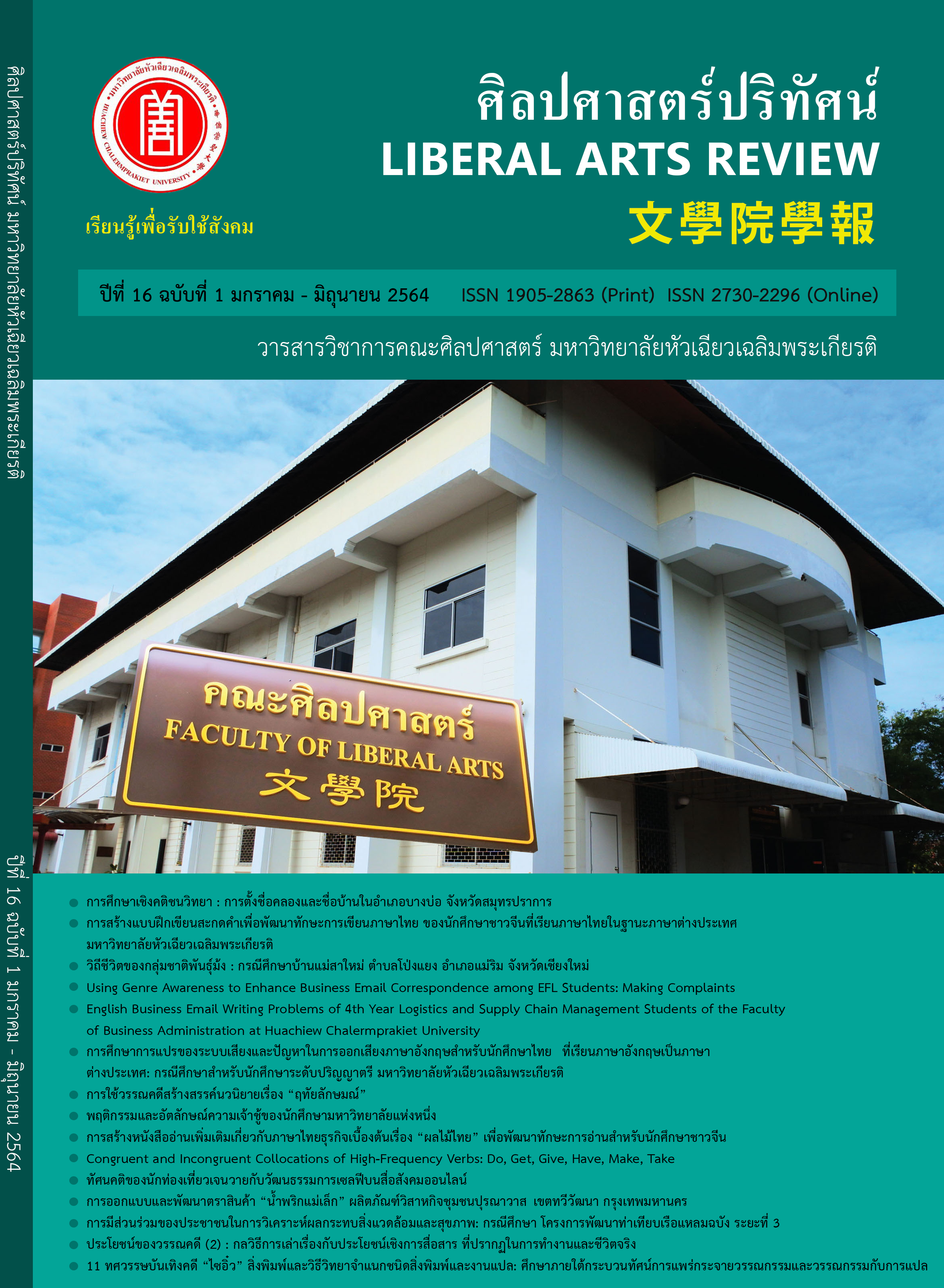English Business Email Writing Problems of 4th Year Logistics and Supply Chain Management Students of the Faculty of Business Administration at Huachiew Chalermprakiet University
Keywords:
Business email writing, problems in email writing, difficulty in business writing skillAbstract
Email writing is one of the basic routine activities in business organization as writing business correspondent is a process that every department and function in the organization must undertake. The purposes of this study were to find out the point of view of students of Logistics and Supply Chain Management at Huachiew Chalermprakiet University as well as their perceived difficulty concerning email writing in English at their workplaces during their internship. The sample was 67 fourth-year students with all the students taking, EG 5243 English Reading Writing for Professional Purposes, a compulsory course for Business Administration students. The research instruments used in collecting data were a five-point Likert scale questionnaire divided into 4 categories: (1) ability in email writing; (2) ordering ideas; (3) vocabulary and grammatical usage; and (4) capital letter and punctuation usage. Major research findings indicated that the most common significant problems students encountered in email writing were choosing appropriate technical words, followed by being unable to use correct grammar in business English emails. The study also suggested that vocabulary and grammatical usage were the most difficult for them in writing English emails. Based on these major findings, students should be prepared with sufficient writing skills before they enter the workplace and engage in Business writing. In addition, teachers may reinforce vocabulary, especially technical words, and grammar drills for students to prepare them to be able to work efficiently.
References
Al-Musalli, A. (2019). Rethinking Business Communication Skills Education: Are Communication
Courses Preparing Students for the Workplace?. College Quarterly, 22 (2). Retrieved from http://collegequarterly.ca/2019-vol22-num02-spring/rethinking-business-communication-skills-education.html
Danet, B. (2001). Cyberplay: Communicating Online. Oxford: Berg.
Decharotchanawirun, T. (2015). A Study of Problems in the Business English Writing Skills of
Thai Employees at the Classic Chairs Company (Independent Study, Thammasat University, 2015). Retrieved from http://ethesisarchive.library.tu.ac.th/thesis/
/TU_2015_5621030609_4583_2614.pdf
Dolidze, T. (2016). Importance and Ways of Raising Cultural Awareness in the English Language
Classroom. International Journal of Arts & Sciences, 9(4), 259–265.
Evans, S. (2014). Teaching business correspondence: Lessons from the globalised workplace. The Asian Journal of Applied Linguistics, 1(2), 102–20.
Gale, P. (2014). Effective business writing: Top principles and techniques. Retrieved January 21, 2021, from https://www.englishgrammar.org/effective-business-writing/
Gimenez, J. C. (2000). Business e-mail communication: some emerging tendencies in register. English for specific purposes, 19(3), 237–251.
Guffey, M. E., Du-Babcock, B., & Loewy, D. (2016). Essentials of business communication. Singapore: Cenage Learning Asia Pte.
Malathong, M. P. (2015). Problems in Writing English Business Emails of Non-Native Speaking Employees in An International Real Estate Service Company in Thailand (Independent Study, Thammasat University). Retrieved from http://ethesisarchive.library.tu.ac.th/thesis/
/TU_2015_5621030732_4892_3441.pdf
Pettersson, L. (2015). Writing Business Emails in English as a Lingua Franca - how informal can you be? : An analysis of formality in BELF emails (Dissertation, Stockholm University). Retrieved from http://urn.kb.se/resolve?urn=urn:nbn:se:su:diva-118100
Prapawuttikul, J. (2004). English writing and speaking needs analysis of MIT support staff (Unpublished Master’s research paper). University of the Thai Chamber of Commerce, Bangkok, Thailand.
Schneider, B., & Andre, J.-A. (2005). University Preparation for Workplace Writing: An Exploratory Study of the Perceptions of Students in Three Disciplines. The Journal of Business Communication (1973), 42(2), 195–218. DOI:10.1177/0021943605274749
Tiensawangchai, T. (2014). Types of Grammar Errors Found in Thai EFL Students' Business
Writing. International Journal of Arts & Sciences, 7(2), 545–555.
Washington, M. C. (2014). The Impact of Writing Assignments in Business Education: Toward a
Competitive Advantage in the Workplace. American Journal of Business Education, 7(3),
–270.
Wijayanti, S. H. (2017, October). The Types of Communication Used in Workplace. In 4th Asia
Pacific Education Conference (AECON 2017) (pp. 224–229). Atlantis Press.
Zhu, W. (2004). Writing in business courses: An analysis of assignment types, their characteristics, and required skills. English for Specific purposes, 23(2), 111–135. DOI: 10.1016/S0889-4906(02)00046-7
Downloads
Published
How to Cite
Issue
Section
License
บทความที่ได้รับการตีพิมพ์เป็นลิขสิทธิ์ของวารสารศิลปศาสตร์วิชาการและวิจัย
ข้อความที่ปรากฏในบทความแต่ละเรื่องในวารสารวิชาการเล่มนี้เป็นความคิดเห็นส่วนตัวของผู้เขียนแต่ละท่านไม่เกี่ยวข้องกับมหาวิทยาลัยหัวเฉียวเฉลิมพระเกียรติ และคณาจารย์ท่านอื่นๆ ในมหาวิทยาลัยฯ แต่อย่างใด ความรับผิดชอบองค์ประกอบทั้งหมดของบทความแต่ละเรื่องเป็นของผู้เขียนแต่ละท่าน หากมีความผิดพลาดใดๆ ผู้เขียนแต่ละท่านจะรับผิดชอบบทความของตนเองแต่ผู้เดียว




